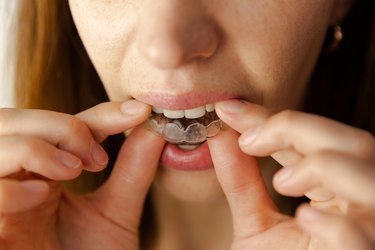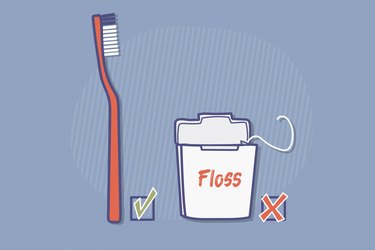
When it comes to protecting your pearly whites from grinding or clenching, dental occlusal guards — better known as night guards — are invaluable. And while they're a terrific tool for your teeth, night guards can also become a bastion for bacteria and other microbes.
"A variety of bacteria, yeasts and molds reside within everyone's mouth," says Kevin Henner, DMD, president of the New York State Dental Association. "These microorganisms can collect and accumulate on occlusal guards when worn over time, along with plaque and tartar."
Video of the Day
Video of the Day
And this can create calcium buildup — those crusty, hard white spots on the surface of your night guard. Gross.
That's why regular cleaning of your night guard is necessary for optimum oral health. Here, Dr. Henner dishes on the dos and don't's of proper cleaning and care for your occlusal guards.
Tip
Recommendations for regular maintenance of night guards can vary, so always read the manufacturer’s directions. “Manufacturers of dental appliances are required to supply instructions for the care of these devices, including the appropriate cleaning procedures and recommendations for properly storing them when not in use,” Dr. Henner says.
How to Clean Your Night Guard
Follow Dr. Henner's simple instructions for cleaning your appliance, and your night guard should stay squeaky clean.
- First and foremost, floss and brush your teeth (yes, in that order) and rinse your mouth with water before inserting your night guard. This will reduce the amount of food and debris that gets stuck in your night guard, making it easier to clean later.
- After each use, rinse the appliance with cool water upon removing it from your mouth.
- Using a soft toothbrush and toothpaste, gently brush the night guard to dislodge debris and any plaque. Gently being the operative word, because toothpaste can be abrasive, and you don't want to scratch the device.
- After cleaning, let the night guard air dry thoroughly before storing it to prevent microbial growth. Lay it on a clean, dry surface, away from moist, humid environments like the bathroom (steam and humidity may warp the material). Similarly, don't dry your appliance in direct sunlight and keep it away from heat sources to avoid warping.
- Once dry, safely stow your night guard in its storage case.
Keeping your case clean is equally as important. The last thing you want is to place your spotless night guard into a dirty, contaminated case. Hand wash your storage case every few days with dishwashing soap and pat it dry completely with a clean cloth.
Deep Cleaning Your Night Guard
In addition to daily maintenance, your night guard also occasionally needs a more thorough cleaning. But you should leave the deep cleaning to your dentist.
"Your dentist can fully examine and evaluate your appliance and refresh it using in-office methods such as ultrasonic cleaning and/or polishing," Dr. Henner says.
So how often do you need a comprehensive cleansing? As a general guideline, get your night guard deep cleaned during your routine dental check-ups, which are typically anywhere from two to four times a year, Dr. Henner says.
Never Clean Your Night Guard Like This…
To keep your device in stellar shape for years to come, avoid the following cleaning methods that may mar your mouth guard.
1. Don't use vinegar, alcohol or hydrogen peroxide. The use of any chemical agent, such as hydrogen peroxide, vinegar or alcohol, can discolor the appliance and may damage the material, Dr. Henner says.
2. Don't use denture cleanser. Denture cleansers may contain peroxide, causing possible discoloration, and persulfate, which is a known allergen, Dr. Henner says.
3. Don't clean or soak your appliance in mouthwash. Some mouth rinses contain alcohol, which, as we know, can stain and tarnish your night guard.
What about alcohol-free, natural mouthwashes? Unfortunately, that won't work either. "Many 'holistic' products are not effective cleaning agents," Dr. Henner says.
4. Don't use hot water. While rinsing your night guard with piping hot water seems like an obvious choice to kill germs, the extreme heat may warp the material.
Is this an emergency? If you are experiencing serious medical symptoms, please see the National Library of Medicine’s list of signs you need emergency medical attention or call 911.


